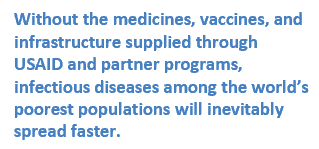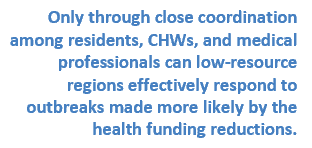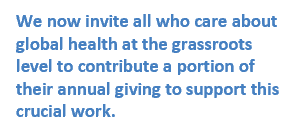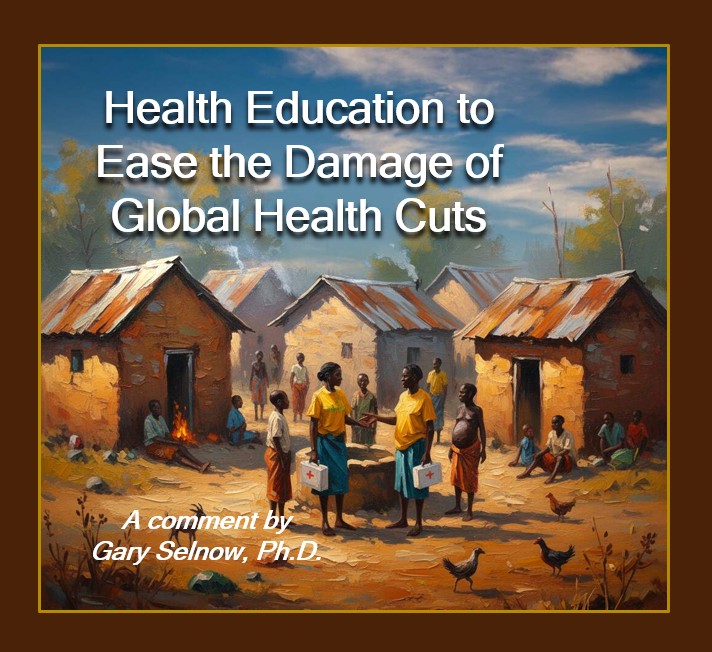Earlier this year, news broke that the administration was cutting funds to USAID and ending support for other global health programs serving low-resource countries. At first, the reports seemed exaggerated or mistaken. How could it be in anyone’s interest to abandon initiatives that consume only 0.3 percent of the U.S. budget but save millions of lives, reduce global health costs and reflect the humanitarian values of a prosperous nation?

Without the medicines, vaccines, and infrastructure supplied through USAID and partner programs, infectious diseases among the world’s poorest populations will inevitably spread faster. Like many observers, we at WiRED immediately recognized the immense human suffering that could follow.
WiRED’s Commitment to Action
As regular readers of this Website probably know, WiRED is a small but resilient nonprofit working in low-resource communities for nearly 30 years. As director of WiRED, I struggled to understand the rationale behind these cuts, but instead of dwelling on the motives, our team pivoted to how we could respond to what was clearly becoming a global health emergency.
WiRED’s budget is modest, but our volunteers bring decades of rich experience in developing and delivering community health education programs. We know how to teach disease prevention, hygiene, healthy living and clinical skills—and how to train Community Health Workers (CHWs) to provide essential frontline care in underserved regions.
Expanding Education to Meet the Crisis
In response to the funding cuts, we immediately began to expand our programs. We developed plans to help communities protect themselves from expected waves of disease by creating dozens of new training modules focused on both prevention and treatment. Further, confident in the skills, dedication and effectiveness of CHWs, we committed to increasing, by fourfold, the number of training sessions in 2026.
At the same time, our computer technicians enhanced WiRED’s free health education app—HealthMAP—which provides worldwide, unrestricted access to our entire library of training materials. The app also features a cost-free continuing medical education program for all CHWs, whether trained by WiRED or other organizations. In addition, the app offers health workers immediate training on preventable diseases that spread to populations in the absence of medicines and vaccines.
New Educational Animations
One of our most promising initiatives is a series of five educational animations designed for students and families. While our primary focus remains CHW training, these animations aim to engage entire communities in understanding and preventing disease. Only through close coordination among residents, CHWs, and medical professionals can low-resource regions effectively respond to outbreaks made more likely by the health funding reductions.
 The animations—open to students, teachers, and families—cover:
The animations—open to students, teachers, and families—cover:
- A broad introduction to infectious diseases
- Steps for preparing communities to limit disease spread
- Guidance on treating cholera, a leading cause of fatal dehydration in children
- Instructions for oral rehydration therapy to save severely dehydrated patients
- Advice on recognizing warning signs and when to contact a CHW
While educational programs cannot replace lost medical aid, strong, community-based public health education can reduce harm, save lives, and build resilience.
A Call for Support
For nearly three decades, WiRED has worked quietly and effectively, asking for donations only once a year. However, our expanded response to this growing crisis is straining our limited resources. We now invite all who care about global health at the grassroots level to contribute a portion of their annual giving to support this crucial work.
 We pledge that 100 percent of every donation goes directly to programs—not to administration or fundraising. For nearly 30 years, our volunteers have served heroically to help others improve health through education, and we remain committed to that principle.
We pledge that 100 percent of every donation goes directly to programs—not to administration or fundraising. For nearly 30 years, our volunteers have served heroically to help others improve health through education, and we remain committed to that principle.
Your support will help us continue delivering vital health education to communities most at risk—empowering them with the knowledge and tools to protect their health and their future.


